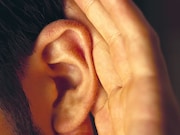Findings suggest that hearing protection, screening, treatment may help reduce risk for dementia
MONDAY, Aug. 12, 2019 (HealthDay News) — Taiwanese individuals between the ages of 45 and 64 years old diagnosed with hearing loss are at a greater risk for developing dementia than those without hearing loss, according to a study published online July 31 in JAMA Network Open.
Chin-Mei Liu, Ph.D., and Charles Tzu-Chi Lee, Ph.D., of the National Taiwan Normal University in Taipei, studied 16,270 participants (9,286 men; mean age, 65.2 years) newly diagnosed with hearing loss during Jan. 1, 2000, through Dec. 31, 2011, to investigate the association between hearing loss and the incidence of dementia within the general population of Taiwanese adults.
The researchers found that 1,868 of the 16,270 participants developed dementia, and the dementia incidence rate in the hearing loss group was higher than in the non-hearing loss group (19.38 versus 13.98 per 1,000 person-years) during the follow-up period. Patients with hearing loss had a significant risk for dementia (hazard ratio, 1.17). Among three age groups (45 to 64, 65 to 74, and ≥75 years), the group aged 45 to 64 years was positively associated with the risk for dementia (hazard ratio, 2.21), and the presence of hearing loss among those aged 45 to 64 years was also associated with the risk for dementia (hazard ratio, 1.40).
“Hearing loss is associated with a higher risk of dementia, and findings suggest that hearing protection, screening, and treatment may be used as strategies to mitigate this potential risk factor,” the authors write.
Copyright © 2019 HealthDay. All rights reserved.








